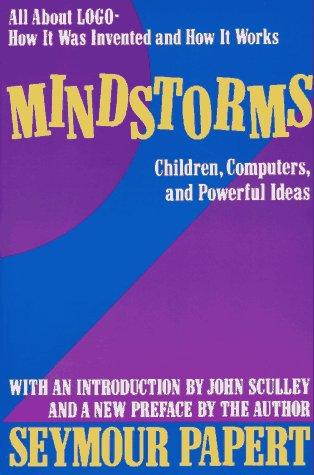nicknicknicknick@bookwyrm.social reviewed Mindstorms by Seymour Papert
Mindstorms
3 stars
1) "If people believe firmly enough that they cannot do math, they will usually succeed in preventing themselves from doing whatever they recognize as math. The consequences of such self-sabotage is personal failure, and each failure reinforces the original belief. And such beliefs may be most insidious when held not only by individuals but by our entire culture."
2) "One day I was surprised to discover that some adults—even most adults—did not understand or even care about the magic of the gears. I no longer think much about gears, but I have never turned away from the questions that started with that discovery: How could what was so simple for me be incomprehensible to other people? My proud father suggested 'being clever' as an explanation. But I was painfully aware that some people who could not understand the differential could easily do things I found much more difficult. Slowly …
1) "If people believe firmly enough that they cannot do math, they will usually succeed in preventing themselves from doing whatever they recognize as math. The consequences of such self-sabotage is personal failure, and each failure reinforces the original belief. And such beliefs may be most insidious when held not only by individuals but by our entire culture."
2) "One day I was surprised to discover that some adults—even most adults—did not understand or even care about the magic of the gears. I no longer think much about gears, but I have never turned away from the questions that started with that discovery: How could what was so simple for me be incomprehensible to other people? My proud father suggested 'being clever' as an explanation. But I was painfully aware that some people who could not understand the differential could easily do things I found much more difficult. Slowly I began to formulate what I still consider the fundamental fact about learning: Anything is easy if you can assimilate it to your collection of models. If you can't, anything can be painfully difficult."
3) "In many schools today, the phrase 'computer-aided instruction' means making the computer teach the child. One might say the computer is being used to program the child. In my vision, the child programs the computer and, in doing so, both acquires a sense of mastery over a piece of the most modern and powerful technology and establishes an intimate contact with some of the deepest ideas from science, from mathematics, and from the art of intellectual model building."
4) "Thus this book is really about how a culture, a way of thinking, an idea comes to inhabit a young mind. I am suspicious of thinking about such problems too abstractly, and I shall write here with particular restricted focus. I shall in fact concentrate on those ways of thinking that I know best. I begin by looking at what I know about my own development. I do this in all humility, without any implication that what I have become is what everyone should become. But I think that the best way to understand learning is first to understand specific, well-chosen cases and then to worry afterward about how to generalize from this understanding. You can't think seriously about thinking without thinking about thinking about something."
5) "What is happening now is an empirical question. What can happen is a technical question. But what will happen is a political question, depending on social choices."
6) "The ethic of school has rubbed off too well. What we see as a good program with a small bug, the child sees as 'wrong,' 'bad,' 'a mistake.' School teaches that errors are bad; the last thing one wants to do is to pore over them, dwell on them, or think about them. The child is glad to take advantage of the computer's ability to erase it all without any trace for anyone to see. The debugging philosophy suggests an opposite attitude. Errors benefit us because they lead us to study what happened, to understand what went wrong, and, through understanding, to fix it."
7) "Imagine a microworld in which things can be ordered but have no other properties. The knowledge of how to work the world is, in terms of the Bourbaki school, the mother structure of order. A second microworld allows relations of proximity, and this is the mother structure of topology. A third has to do with combining entities to produce new entities; this is the algebraic microstructure. The Bourbaki school's unification of mathematics is achieved by seeing more complex structures, such as arithmetic, as combinations of simpler structures of which the most important are the three mother structures."
8) "The emergence of motion pictures as a new art form went hand in hand with the emergence of a new subculture, a new set of professions made up of people whose skills, sensitivities, and philosophies of life were unlike anything that had existed before. The story of the evolution of the world of movies is inseparable from the story of the evolution of the communities of people. Similarly, a new world of personal computing is about to come into being, and its history will be inseparable from the story of the people who will make it."
9) "In 1964 I moved from one world to another. For the previous five years I had lived in Alpine villages near Geneva, Switzerland, where I worked with Jean Piaget. The focus of my attention was on children, on the nature of thinking, and on how children become thinkers. I moved to MIT into an urban world of cybernetics and computers. My attention was still focused on the nature of thinking, but now my immediate concerns were with the problem of artificial intelligence: How to make machines that think? Two worlds could hardly be more different. But I made the transition because I believed that my new world of machines could provide a perspective that might lead to solutions to problems that had eluded us in the old world of children. Looking back I see that the cross-fertilization has brought benefits in both directions. For several years now Marvin Minsky and I have been working on a general theory of intelligence (called 'The Society Theory of Mind') which has emerged from a strategy of thinking simultaneously about how children do and how computers might think."

